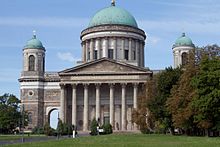Basilica of Esztergom
| The Cathedral and Primatial Basilica of the Blessed Virgin Mary Assumed Into Heaven and St Adalbert | |
|---|---|
 |
|
| Basic information | |
| Location | Esztergom, Hungary |
| Geographic coordinates | 47°47′56″N 18°44′11″E / 47.79889°N 18.73639°ECoordinates: 47°47′56″N 18°44′11″E / 47.79889°N 18.73639°E |
| Affiliation | Roman Catholic |
| Rite | Latin |
| District | Esztergom-Budapest |
| Country | Hungary |
| Year consecrated | 1856 |
| Ecclesiastical or organizational status | Cathedral, Primatial Basilica |
| Status | active + treasury museum |
| Website | Website of the Basilica |
| Architectural description | |
| Architect(s) |
Pál Kühnel János Packh József Hild József Lippert |
| Architectural type | Basilica |
| Architectural style | Neoclassical |
| Groundbreaking | 1822 |
| Completed | 1869 |
| Specifications | |
| Direction of façade | East-Northeast |
| Length | 118 m (387 ft 1.7 in) |
| Width | 49 m (160 ft 9.1 in) |
| Height (max) | 100 m (328 ft 1.0 in) |
| Dome(s) | 3 |
| Dome height (inner) | 71.5 m (234 ft 7.0 in) |
| Dome dia. (outer) | 33.5 m (109 ft 10.9 in) |
The Primatial Basilica of the Blessed Virgin Mary Assumed Into Heaven and St Adalbert (Hungarian: Nagyboldogasszony és Szent Adalbert prímási főszékesegyház), also known as the Esztergom Basilica (Hungarian: Esztergomi bazilika), is an ecclesiastic basilica in Esztergom, Hungary, the mother church of the Archdiocese of Esztergom-Budapest, and the seat of the Catholic Church in Hungary. It is dedicated to the Saint Mary of the Assumption and Saint Adalbert.
It is the largest church, and the tallest building, in Hungary. Its inner area is 5,600 m². It is 118 m long and 49 m wide. It has a reverberation time of more than 9 seconds. Its dome, forming a semi-sphere, is situated in the middle, and it has 12 windows. It is 71.5 m high inside, with a diameter of 33.5 metres, and is 100 m high from outside, counted from the crypt.
The altarpiece (13.5 × 6.6 metres, depicting the Assumption of the Blessed Virgin Mary, by Girolamo Michelangelo Grigoletti) is the largest painting in the world painted on a single piece of canvas.
The basilica is also known for Bakócz Chapel (named after Tamás Bakócz), built by Italian masters between 1506–1507 out of red marble of Süttő, its walls adorned with Tuscan Renaissance motifs. It is the most precious remaining example of Renaissance art in Hungary.
The huge crypt, built in Old Egyptian style in 1831, is today the resting place of late archbishops, among others, József Mindszenty, famous for his opposition to both Nazi and Communist rule.
...
Wikipedia
